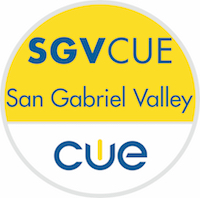Abigail Ramirez, Pomona USD
@CSwithRamirez.
Computer Science is not just about the acquisition of a programming language, it facilitates the development of critical thinking skills, problem solving, persistence, and logic. If you agree with previous statement, chances are you have taken part of the Hour of Code fun, and have been asking yourself what’s next? Truthfully, I do not have most of the answers. However, I will share my experience and some tips fellow educators have graciously shared with me along the way. Moreover, I want to respect your teacher time, so feel free to use the headings to help you skip around.
What is the Hour of Code?
The Hour Code is a world-wide effort to provide a one-hour introduction to computer science with a no-experience is necessary approach. Resources are available as an online (plugged), offline (unplugged) lessons for Pre-Readers to 12th graders. Best of all, it’s FREE! CODE.org has curated some marvelous resources: https://hourofcode.com/us. Including partner free printable resources, like certificates! These resources are available for all teachers year-round.
I am an Elementary Teacher; I don’t have time in the instructional day
Why not connect computer science to the awesome work you are already doing. For example, providing students with an opportunity for a brain break or class challenge utilizing an Hour of Code resource. Or Story telling using a free song writing activity that teaches loops, complete with teacher how-to video: https://studio.code.org/s/course1/stage/12/puzzle/1. Kodable’s Free Hour of Code Math based Pizza Party Planner http://resources.kodable.com/public/pizza_party_inquiry_sheets.pdf .
I met an awesome 1st grade teacher that utilizes a foam dice, a painters-tape grid on a table, a sticky note finish line, and a “robot” toy car to reinforce counting. She has her students count the circle dots on the dice after rolling, move the car that many spaces, the class records it on the “Programmer’s Whiteboard” complete with directional arrows and number of time they need to move. When her students reach the finish line, they “run the program” and see if their “robot” toy car makes it to finish line again! This reminded me very much of the impressive work from San Francisco Unified CSinSF: https://sites.google.com/sfusd.edu/k-2cs/level-1/unit-2-bee-bots?authuser=0 This is just the tip of the iceberg of resources available for teachers: https://hourofcode.com/us/learn .
I am a Middle and/or High School teacher… what’s available for me?
Nice to meet you fellow secondary teacher! Are you an English or History Teacher by any chance? If you are working on informational essays and would like to provide an opportunity for student choice or a challenge, have them use the VidCode Code the News Challenge: https://app.vidcode.com/project/hoc-news . Students can use all domains of language, and research skills as they can write their essay, record their research, listen and fine-tune their production, code and create their news broadcast. VidCode has a pretty awesome digital postcard that could be used in conjunction a fiction or a nonfiction novel or historical artifacts https://app.vidcode.com/project/hourofcode-gs-2 , complete with instructional video.
If you are a Math Teacher, Codesters has a lesson on Transformations: https://www.codesters.com/curriculum/hour-of-code-2017/Transformation+Puzzles/1/ , Google has a great lesson on budgeting and calculating with Python: https://applieddigitalskills.withgoogle.com/c/middle-and-high-school/en/plan-and-budget/overview.html , Harvard’s Scratch has great opportunity for use of Co-ordinate planes http://scratched.gse.harvard.edu/resources/scratch-every-subject-math and so many more FREE teacher created resources. Science Teachers, with NGSS testing and scientific simulations become part of the curriculum, Harvard’s Scratch interface has some very practical lessons http://scratched.gse.harvard.edu/resources/series-circuit-simulation-challenge. Project GUTS is Science based Computer Science initiative has a really fun Paper, Rock, Scissors lesson that help participants understand Biology, and data science: https://hourofcode.com/files/PGUTSRockPaperScissors.pdf .Tynker has a interactive solar system lesson: https://www.tynker.com/hour-of-code/tynker-stem-teacher-guide.pdf
Many more content specific Resources are available at: https://hourofcode.com/us/learn .
Could computer science be introduced to all students?
Yes, but sometimes you have to create that opportunity for all students. My middle schoolers became CS ambassadors for our whole school for 1 week, with the support and cooperation of my fellow educators. Each day, during our “Spartan Period” – 20 min rotating homeroom- these student CS ambassadors, proudly donned their Ambassador badges and lead fellow students in mini-CS lessons using the Hour of Code Resources. This is remarkable accomplishment since my students are of varying skills and abilities. We debriefed during our regularly scheduled classes and adjusted the student-curated lessons, reinforced strategies, and even practiced providing support. CS ambassadors culminated the week in a student-led CS EXPO in our library including a hands-on mouse bot maze, Robotics Center, Student coding showcase, Gamer’s corner (Student’s built games), Google Logo Showcase, and many more. The result? They reached their peers, connected with other students across the campus, felt empowered, used problem solving, and exhibited leadership. Does this mean that all the students on my campus want to study computer science or become programmers? No, and we didn’t expect them to. Our goal was give them an opportunity to at least know and try-out what computer science is like.
Is there a deeper impact?
All that we do as educators is in hope that it WILL positively impact our students. I’ve seen students take positive academic risks, including applying to and getting accepted into summer coding camps at local prestigious universities, take personal challenges and create new ideas. Push themselves and be willing to make mistakes (aka learning opportunities). Students are pretty amazing; you never know how far a small learning opportunity may take them. That is what giving them an educational opportunity is all about.
Even more resources: http://www.arkansased.gov/divisions/special-projects/arkansas-computer-science-initiative/computer-science-teacher-and-curriculum-resources
Professional Development Opportunities:
http://www.infosys.org/infosys-foundation-usa/pathfinders/
https://code.org/professional-development-workshops
Abigail Ramirez is a Teaching Teacher Specialist, Technology Teacher Lead, ELA and Computer Science teacher for Pomona Unified School District. Connect with Abigail via email or on Twitter at @CSwithRamirez.

Recent Comments